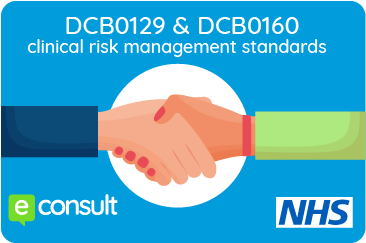If any digital healthcare supplier is not meeting NHS standards, you are responsible under DCB0160.
During the course of the pandemic, we have seen a tenfold increase in the number of patients using eConsult. Greater usage of online consultation and lowering standards is a recipe for disaster. At eConsult patient safety is at the heart of everything we do, so we believe it is vital everyone is compliant. To help everyone understand their obligations we have put together the following resources.
Are you clear what DCB0160 is all about?
Register for our free webinar with its author Stuart Harrison
Standards DCB0129 and DCB0160 set out the clinical risk management framework for providers and health organisations alike, to ensure the highest standards of quality in the NHS with respect to digital health system assessment and deployment.
As an IT healthcare supplier, we are fully compliant with DCB0129, the NHS standard that is mandatory for us to adhere to for patient safety. As a healthcare organisation procuring and implementing a health IT system you need to be compliant with DCB0160.
We’ve joined forces with Stuart Harrison, the author of the standard, to host a webinar to go over this requirement and what it means for you. He’ll be running this with Dr Aravinth Balachandran, our in-house CSO.
On-Demand: Register below
*Orcha https://www.orcha.co.uk/the-challenge/
FAQs
What is DCB0160?
DCB 0160 is the clinical risk management standard which NHS organisations need to comply with when they implement health systems. The standard is governed by NHS Digital and is mandatory under the Health and Social care Act 2012. Digital health technology can introduce risk, as well as mitigate against clinical risk.
Who needs to meet DCB0160?
Any organisation purchasing and implementing a health system, needs to adhere to DCB0160. This includes CCGs, Healthboards, PCNs or Practices that implement a health system are accountable for ensuring this standard is adhered to and as such, they need to have a clinically qualified individual (a CSO, Clinical Safety Officer) in order comply to this standard.
What do I need to to be DCB0160 compliant?
DCB0160 states you must have:
1. Clinical Risk Management Plan
2. Clinical Safety Case Report
3. Hazard Log
4. And an accredited Clinical Safety Officer (CSO) must sign this off.
Why is DCB0160 important?
DCB0160 exists to ensure that any health systems have been passed for clinical risk and continue to be implemented in a way that prevents patients harm. As more patients are using online consultation the risk of harm is also increasing. We are now processing over one million eConsults per month and it’s not just the volumes that have risen significantly. Even with improvements to our ‘red flagging’ approach, the number of complex cases has risen by 300%. We are proud to report no serious incidents.
We urge you to check your providers comply with DCB0129 and the quality of their compliance.
Where can I find out more about DCB0160?
Our CSO, Dr Aravinth Balachandran has written a blog outlining the DCB standards. Foundation level learning can be found from the following link: e-learning for Healthcare: Clinical Risk Management Training Programme This e-learning has been developed by the Clinical Safety Team at NHS Digital in partnership with Health Education England e-Learning for Healthcare. Additional learning can be found here: Clinical Safety & Risk Management (theiet.org) This is a comprehensive series of byte-sized e-Learning modules that cover all aspects of clinical safety, including NHS digital health standards, medical devices and more. Additional to this, there are practical courses available for how to become an accredited Clinical Safety Officer or clinical safety practitioner (non-clinical); to support the clinical safety work we do. Clinical Safety Officer Training
What is DCB0129?
DCB0129 applies to suppliers of health systems. In accordance with DCB0129, we apply Clinical Risk Management principles and
– hold a clinical risk management plan,
– a hazard log,
– a clinical incident log
– and produce a clinical safety case reports to provide assurance on our clinical safety.
Is eConsult DCB0129 compliant?
Yes, but that’s just part of our clinical risk governance story.
We have been developed by NHS clinicians and place clinical safety as a core principle within our business. Our clinical development team makes up 20% of our staff. We have a mixture of GPs and senior nurses who author new content based on the latest guidelines including National Institute of Clinical Excellence (NICE), Clinical Knowledge Summaries (CKS), NHS.UK and other referenced sources. Our clinical governance group has representation from a pool of 26 external clinicians from various specialities including A&E, ITU, Pharmacy and Paramedics to provide critical feedback on the clinical safety elements of our templates.
What is a CSO and who needs to have one?
A CSO is a Clinical Safety Officer (CSO). A CSO must be a clinician, and will need to be trained in clinical risk management. The CSO will be responsible for overseeing the clinical risk management including how Health systems are implemented and chosen.
As a company, we have our own CSO, Dr Aravinth Balachandran.
Can a Dr sign off a DCB0160 instead of a CSO?
No
Who enforces the DCB standards?
It is the responsibility of the Care Quality Commission to ensure adherence to the standards. They have the power to inspect and have extensive measures in place to protect the quality of care. It will also be a key theme in the NHS Patient Safety Strategy. There is a commitment to implement safer solutions throughout the NHS and digital health will have greater focus following the difficult times the NHS has faced this past year. Regulators are certainly enhancing their signal detection relating to effectiveness measures and quality of digital health commissioning and use.



